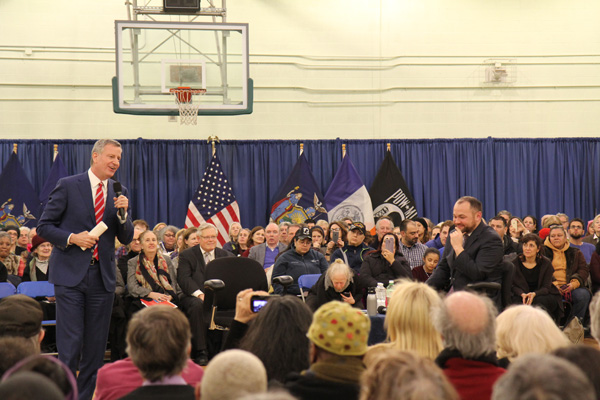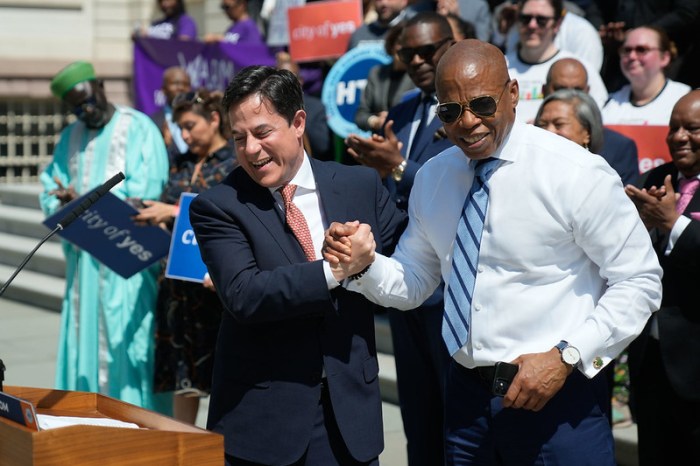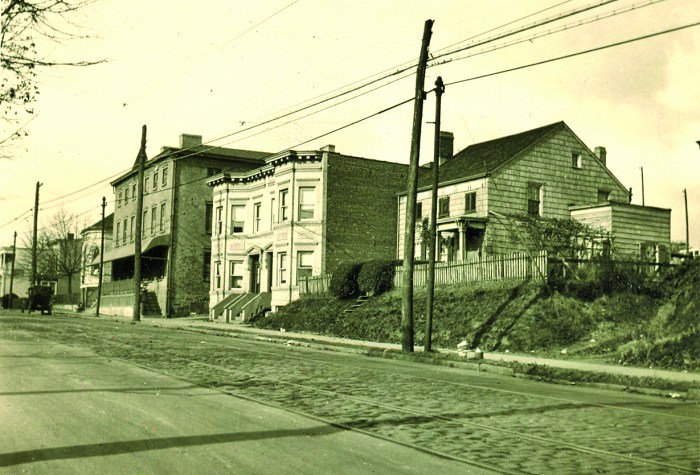
BY DENNIS LYNCH | Mayor Bill de Blasio answered dozens of questions from New Yorkers during two hours of Q&A at a West Side town hall on March 15. Anyone could ask the mayor whatever they wished, and the crowd who turned out at the Lab School for Collaborative Studies on West 17th Street pressed de Blasio on topics ranging from excessive honking to how the city will push back on President Donald Trump’s policies.
Appearing with West Side City Councilmember Corey Johnson — with a brief appearance by Borough President Gale Brewer, as well — de Blasio also had commissioners and deputy commissioners from many of the city’s agencies on hand to answer specific questions. He often chose to defer to them.
Answering a question about “underfunding” at the city’s public schools, de Blasio said, “We need to fight harder” for state funding — though he voiced confidence that “we will hit 100 percent fair funding for every school by 2021.” Johnson followed him and said that “we have to turn the State Senate Democratic” if the city wants to better secure school funding, among other things.
Control of the State Senate, which nominally has a one-vote Democratic majority even though defections continue to leave the chamber under Republican control, was an issue that Johnson and de Blasio returned to repeatedly. When asked broadly about the city “getting out from under the yoke of Albany,” the mayor said the first thing he would do is “strengthen rent regulation.”
Education issues came up several times during the town hall. A public schoolteacher asked de Blasio about ensuring that immigrant children feel safe in school. The mayor said that he and Schools Chancellor Carmen Fariña have told parents and students “that they are respected and protected regardless of their origins, regardless of their immigration status, and that when they come to their school they are in someplace safe and that no information will ever be shared with the federal authorities.”
On a broader question regarding New York’s sanctuary policies, the mayor said the city would provide legal assistance to individuals who are wrongly threatened with deportation.
One school parent asked de Blasio if he was doing anything to decrease school size and to counter policies hurting public schools that many expect out of Trump’s secretary of education, Betsy DeVos.
“We’re never going to go to vouchers,” de Blasio said, speaking of publicly funded grants for students to attend private schools.
He added that budget issues, a growing population, and severe overcrowding elsewhere in the city “does not allow us to do as much as we want to on class size.”
One woman in the crowd asked about helping small businesses stay alive in the face of skyrocketing rents. Johnson said commercial rent regulation, which has been proposed in the city for years via the Small Business Jobs Survival Act, can’t happen without Albany’s support.
“It’s never going to happen, because of Albany,” he said. “Let’s turn the State Senate Democratic and then talk about all the wonderful things we want to do in the world.”
Manhattanites may be dismayed to learn de Blasio “is not there yet” on congestion pricing, a scheme that would impose costs on drivers entering Midtown and Downtown. He’s not convinced it’s the right approach to tackling traffic congestion; nor is he confident it could be approved in Albany.
Miguel Acevedo, a tenant leader, charged the city had failed to carry out a city-community agreement to help minority and women-owned business enterprises open in Hudson Yards. The mayor responded by speaking broadly about the city’s efforts on that front, saying, “We are constantly pushing the private sector to commit resources to women- and minority-owned businesses.”
He then handed the issue off to Gregg Bishop, commissioner of the Department of Small Business Services, who said his agency is working to organize job fairs for jobs at Hudson Yards and is making sure that Related Companies, which developed the area, is “aware of the companies certified with us for future opportunities” there.
Many locals pushed de Blasio about land use.
Community Board 4 Clinton / Hell’s Kitchen Land Use chair Jean-Daniel Noland asked the mayor for help in bringing affordable housing to the district and got some good news about two sites in the district. The city has worked out “very close” to 100 percent affordable housing at the Slaughterhouse Site on 11th Avenue at West 39th Street and will soon designate a developer. Molly Park, the deputy commissioner of the Department of Housing Preservation and Development, added that her department would issue a request for proposals regarding two affordable sites at Hudson Yards in the late spring or early summer.
Rick Chandler, the commissioner of the Department of Buildings, was put on the hot seat late in the town hall when asked about bad actor landlords who misrepresent the status of their buildings to obtain demolition permits to scare off rent-regulated tenants — action that in some cases can be a felony. Many West Siders believe the DOB has failed to properly enforce its own rules.
Chandler said he would “love nothing more than to get an owner on a felony if I could,” and that he was working to remedy loopholes in DOB permit applications that allow landlords to misrepresent their buildings. De Blasio added that his administration was hiring more inspectors to help enforce the rules that exist.
The new president’s budget proposal also came up during the town hall, though de Blasio and others were quick to point out that what Trump has so far laid out is lacking in specifics. One woman — noting that Trump wants to slash the $8.1 billion budget of the Environmental Protection Agency by $2.4 billion, or more than 25 percent — asked whether the city’s Department of Environmental Protection could step up in the absence of necessary federal action.
“We cannot do everything the EPA does, I think that’s the sad truth,” de Blasio responded. “We can use all our powers and work with the state… If we see there is some gap, we can legally act on.”
De Blasio said he would fight federal cuts at the Department of Housing and Urban Development to stave off devastating reductions in the budget of the New York City Housing Authority, which maintains the nation’s largest public housing program.
Early in the town hall, the mayor plugged his plan to consolidate homeless shelter beds from hundreds of hotels and apartments into 90 city-designated shelters, but no one asked him about that plan. Johnson is a co-sponsor of legislation that seems at odds with the de Blasio plan that would site shelters in the communities from which people enter the shelter system.
Proponents of the Council alternative argue their proposal would spread shelters more “equitably” across the city.
De Blasio also advocated for his “mansion tax” — a 2.5 percent tax on the sale of homes $2 million or higher. The city’s Office of Management and Budget estimates it could net $336 million in the fiscal years 2018, according to the New York Post. That tax would come on top of a 1 percent tax levied by the state since the late 1980s on home sales of $1 million or more.




























